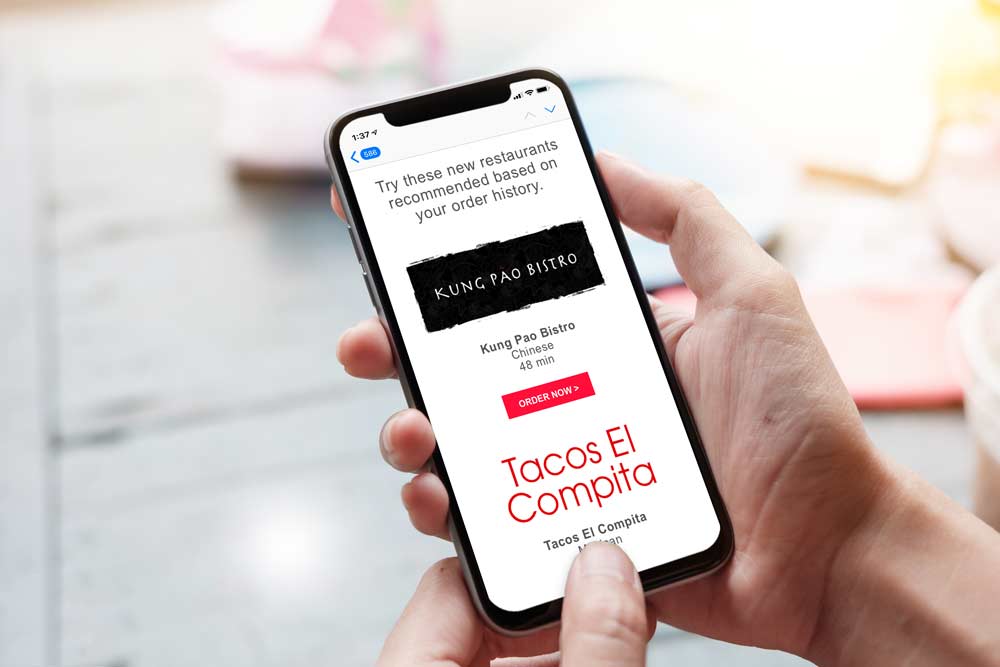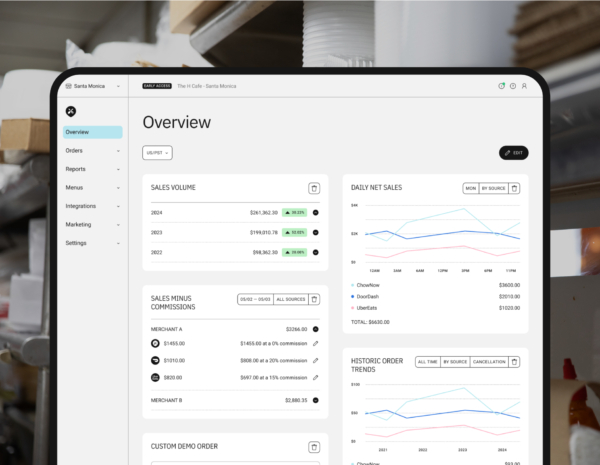Why Big Third-Party Apps Want Your Restaurant Data

Online food ordering’s growth has led to a massive change in the way that restaurants do business. It’s a development that can extremely beneficial: online ordering increases order sizes, makes operations more efficient, and generates valuable restaurant data. Whether or not your restaurant sees all of these benefits, though, depends on what online ordering provider you sign up with.
In addition to charging restaurants steep commissions that siphon their profits and diverting their digital traffic to get more sales, third-party marketplaces withhold important customer data that’s essential for strategic marketing. Read on to understand why this data is so critical and how third-party apps are using it.
Why is your restaurant data valuable?
Of all the restaurant data you can potentially collect, your customer database is the most important when it comes to marketing and ensuring repeat orders. Your guests’ email addresses are essential for maintaining contact with them and prompting them to order again. Data about their ordering habits, meanwhile, helps you see patterns in how they interact with your restaurant. Consider these examples of customer data, the trends they illustrate, and the ideas that they can spark.
- Scenario 1: You might notice customers with business email addresses placing large orders. These are probably office orders placed on behalf of a team of people. How might you show appreciation for the office administrator who is placing the order for everyone? What tactics could you use to encourage these customers to order from your restaurant when they’re not on the clock?
- Scenario 2: Perhaps you find that a large percentage of your online orders are coming through customers’ mobile devices. You might conclude that these diners are often on the go and appreciate the convenience of ordering online from your restaurant. Consider ways in which you can make their experience even easier so they reorder more frequently.
- Scenario 3: Maybe you see a dip in returning diners one month. Think about how you could entice more customers to order again through an engaging promotion delivered straight to their inbox.
All of these scenarios show how your customer data helps you understand who your guests are and what they want. The fact that your restaurant data is so valuable for developing marketing strategy is exactly why third-party marketplaces want it for themselves.
How are marketplaces using your customer data?
Third-party food delivery apps insert themselves between your restaurant and your diners, blocking you from establishing relationships with them. If you work with any of these middlemen, chances are that you can’t access your own customer data.
Commissions-based marketplaces withhold customer email addresses in order to sell their marketing services to the highest bidder. They make use of your customer database to promote your competition to your guests, sending them to restaurants that pay out higher commissions.

Marketplaces aren’t just hungry for your customers’ email addresses—they’re also eager to leverage the data you and your customers provide them.
An analyst speaking to CNBC notes, “The battle between restaurants and their new digital competitors is not a fair fight…[Marketplaces like] Uber Eats can collect and use data to drive precise decisions about everything they do, whereas traditional restaurants have never really had access to the same type of data and did not make it a part of their DNA.” Academics agree, commenting, “The data-centric view of dining taken by Uber Eats and its competitors is helping to drive a major upheaval of the restaurant business.”
Uber Eats is so data-driven that it creates restaurant concepts based on market trends. It assesses restaurant data and customer demand and works with either existing restaurant storefronts or ‘cloud kitchen’ operators to open ‘ghost kitchens‘ that serve orders exclusively through the Uber Eats app. When existing restaurants sign up for this, they may see increased order volume, but it is Uber Eats that’s profiting at the end of the day. Ghost kitchens that aren’t operated out of real restaurants are sometimes run out of shipping containers, parking lots, and even under bridges. These concepts manipulate the market, take business away from local restaurants, and flout health and finance regulations.
The big restaurant chains have been ahead of the curve.
Many national chains have already adopted this data-driven way of doing business. TGI Fridays for instance, has used data to make strategic choices that doubled to-go sales within a year and tripled takeout order frequency.
Other chains decided to join forces with third-party marketplaces because of data policies. Yum! Brands—the parent company of KFC, Taco Bell, and Pizza Hut—knows the value of restaurant data, and that’s a significant reason why the corporation invested in Grubhub. Yum!’s investment in Grubhub waived online ordering commissions for its 18,000+ US locations, and provided Yum! with full access to Grubhub’s data on their stores. This agreement gave both Yum! and Grubhub a major advantage compared to independent restaurants. Similarly, the deciding factor for Shake Shack’s exclusive partnership with Grubhub was that Grubhub agreed to share data with the burger chain.
You can still take action.
Faced with these shady practices, it’s worth remembering that your restaurant data can be a force for good. You can and should use your restaurant’s data to communicate with your guests, engage them to order again, and make business choices that keep you, your customers, and your staff happy.
Plus, more and more independent restaurateurs, consumers, and governments are aware of just how critical data sharing is. Amid the recent third-party delivery app regulation that was sparked by the pandemic, New York City proposed a bill that requires third-party apps to share data with restaurants. Unfortunately, DoorDash sued the city and the bill hangs in limbo—which just goes to show how valuable this information is.
Some online ordering providers, like ChowNow, readily give their restaurant partners their data. Rather than leveraging restaurant data to heighten competition between your eatery and others—or using it to squeeze extra profits out of you—ChowNow gives you a whole database to use as you see fit. Schedule a demo with a ChowNow online ordering specialist and see how you can take control.





